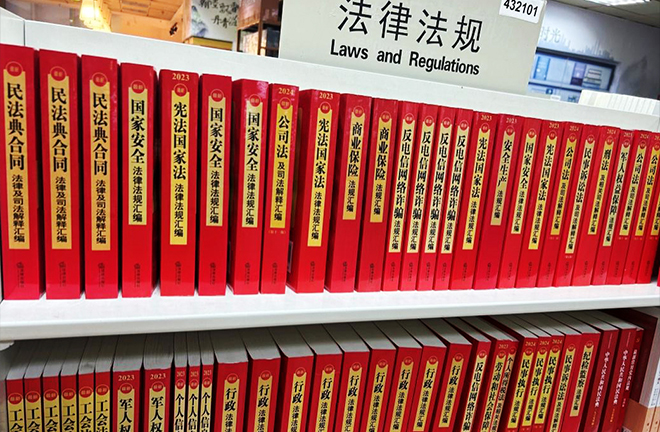Int’l scholars eye legal supervision of digital platforms

A bookshelf of laws and regulations at Wangfujing Bookstore in Beijing Photo: Yang Lanlan/CSST
On July 17, the Third China-Korea Competition Law Frontiers Forum and the Fourth Nankai University Economic Law Forum gathered scholars from China and South Korea in Tianjin. Attendees explored the theme of “Challenges and Solutions to the Regulation of Digital Platforms in China and South Korea,” and conducted in-depth discussions on pressing issues such as the regulatory dynamics of digital platforms, competition regulation cases, and privacy protection within the platform economy.
Monopoly
The development of the digital economy matters worldwide, with several Chinese enterprises, such as Pinduoduo, entering the South Korean market. In the view of Chen Bing, director of the Competition Law Research Center at Nankai University (NKU), in the context of the growing trend of globalization in competition law, both China and South Korea have adopted separate legislative models concerning anti-monopoly and anti-unfair competition. This commonality facilitates academic dialogue between the two countries.
Feng Bo, deputy dean of the School of Law at Tianjin University of Finance and Economics, explained that antitrust follow-on lawsuits can reduce the evidentiary burden on plaintiffs compared to standalone litigation and achieve effective coordination between public and private enforcement of antitrust laws. Methods for measuring monopolistic harm typically include comparing pre- and post-monopoly prices, using marginal or average costs in place of market prices, and analogizing with prices in similar markets.
Lu Haijun, a professor from the School of Law at the University of International Business and Economics, echoed that openness and innovation represents the core competence of the market, which therefore calls for regulation of monopolistic behaviors based on technological advantages.
Regulatory regimes
As global digital economy legislation accelerates, improving its governance system has been a primary focus of competition law scholars. Jiao Haitao, a professor from the Civil, Commercial, and Economic Law School at the China University of Political Science and Law, argued that the EU’s Digital Markets Act may not be suitable for China. Debate persists over whether to introduce such a “gatekeeper” standard, and the degree to which it is applicable.
The participating South Korean scholars contributed a detailed overview of South Korea’s digital economy regulation. According to Bong-Eui Lee, a professor from the School of Law at Seoul National University (SNU), the COVID-19 pandemic has exposed the contradictions between traditional industries and digital platforms in South Korea, making it difficult to institute a new regulatory framework suited to the digital economy. The country is striving to motivate platform innovation and create free and fair competition conditions.
Kyung-Won Yoon, a researcher at the Center for Competition Law at SNU, pointed out that South Korea envisions improving its regulatory regime by making platforms more transparent and establishing a system of class actions.
Seong-Min Jeon, a professor of law at Gachon University in South Korea, believes that relevant policies in South Korea are relatively unstable, whereas China’s policies feature greater consistency, which could provide some legislative inspiration for South Korea.
To improve the regulatory framework for monopolistic practices by platform enterprises, Jin Shanming, a research fellow from the Institute of Law at the Chinese Academy of Social Sciences, advocated for a thorough understanding of the competitive conditions across various sectors of the platform economy. He called for more attention to hidden anti-competitive behaviors and consequent harms introduced by new models, technologies, and industries to foster a healthier digital ecosystem.
Privacy protection
Privacy protection in the platform economy is increasingly becoming a widespread societal concern. Participating scholars shed light on how to balance data acquisition, retention, and usage practices of digital platform enterprises with the protection of user data, particularly privacy interests.
Ye Weiping, a professor from the Law School at Shenzhen University, suggested that addressing new issues arising from the development of the platform economy requires not only focusing on antitrust regulation methods but also considering the application of unfair competition law. In this regard, South Korea’s rule of law experiences could serve as a valuable reference. At the same time, there is a need for more experimentation with foundational institutional frameworks, rules, and tools for governing the behavior of digital platform companies.
Zhang Yongzhong, dean of the School of Law at South China Normal University, warned that it is necessary to consider the impact of establishing a legal system for the protection of personal information on the subsequent use of personal data. Since market entities possess different capabilities in personal information collection and processing, the unification of personal data collection standards may impact how market entities benefit from data development and utilization. The establishment of different standards serves to test the level of enforcement and capability.
According to Young Gug You, a professor of law at Hanshin University in South Korea, the overlapping areas of competition and data privacy in the digital ecosystem are expanding rapidly, and now include the relationship between data privacy and monopolistic conduct, the consideration of competition factors in the decision-making of data protection agencies, and the contradictory coordination between the two policy fields.
The conference was co-hosted by the School of Law and the Competition Law Research Center at NKU.
Edited by YANG LANLAN
